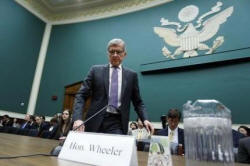|
 With
1 million comments, U.S. net neutrality debate nears first marker With
1 million comments, U.S. net neutrality debate nears first marker
 Send a link to a friend
Send a link to a friend
[July 19, 2014]
By Alina Selyukh
WASHINGTON (Reuters) - U.S. companies,
consumer advocates and citizens submitted more than 1 million comments
to the Federal Communications Commission, drawing contentious divisions
on the issue of net neutrality as the first deadline to comment
approached Friday.
|
|
 The FCC will continue collecting comments, made in response to
these first submissions, until Sept. 10 as it weighs how best to
regulate the way Internet service providers (ISPs) manage web
traffic crossing their networks. FCC Chairman Tom Wheeler proposed
new rules in April after a federal court struck down the FCC's
previous version of such rules in January. The FCC will continue collecting comments, made in response to
these first submissions, until Sept. 10 as it weighs how best to
regulate the way Internet service providers (ISPs) manage web
traffic crossing their networks. FCC Chairman Tom Wheeler proposed
new rules in April after a federal court struck down the FCC's
previous version of such rules in January.
The FCC's draft rules propose banning ISPs from blocking users'
access to websites or applications but allowing some "commercially
reasonable" deals between content providers and ISPs to prioritize
delivery of some web traffic.
Though Wheeler has insisted the FCC would carefully guard against
abuse of the rules to hurt competition or consumers, the proposal
drew ire from public interest groups and large web companies that
say it would result in faster download speeds for some content at
the expense of other content, which would inevitably be relegated to
"slow lanes."

As the push against paid-prioritization spread across the web,
thousands wrote to the FCC and the proposal has now attracted one of
the biggest responses in the FCC's history, nearing the record 1.4
million comments the regulators received after the 2004 Super Bowl
broadcast that exposed viewers to a glimpse of singer Janet
Jackson's breast.
"Dear FCC," read numerous comments filed using a template created by
the Electronic Frontier Foundation group.
"Net neutrality, the principle that (ISPs) treat all data that
travels over their networks equally, is important to me because
without it ISPs could have too much power to determine my Internet
experience by providing better access to some services but not
others."
Consumer advocates and some web companies, including online video
services Netflix Inc and Vimeo, want to reclassify ISPs as
telecommunications services and regulate them more like public
utilities - an idea rejected by the ISPs and by Republicans both in
Congress and at the FCC.
[to top of second column] |

Experts disagree on whether or how reclassification would
effectively prevent pay-for-priority deals. Wheeler has not proposed
reclassification as the solution, but has not taken it off the table
as a potential route.
The National Cable and Telecommunications Association, AT&T Inc,
Verizon Communications Inc and Comcast Corp wrote to the FCC in
opposition of reclassification, saying the "radical" move would
impose arcane rules on the quickly changing marketplace and may
raise costs for supporting already expensive network infrastructure.
They say they have no plans to create any "slow lanes."
AT&T, though, said the FCC could ban paid prioritization without
reclassifying ISPs. It is unclear how the approach would stand up in
court. Verizon and Comcast supported the "commercially reasonable"
standard.
Cable trade group came out in support of setting the same net
neutrality rules for wireless and fixed broadband, something long
urged by consumer advocates and recently also backed by large web
companies.
(Reporting by Alina Selyukh; Editing by Andrea Ricci)
[© 2014 Thomson Reuters. All rights
reserved.] Copyright 2014 Reuters. All rights reserved. This material may not be published,
broadcast, rewritten or redistributed.
 |